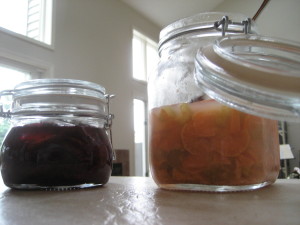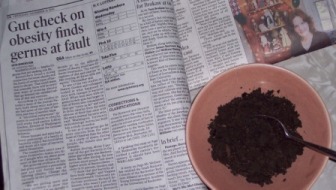Here’s a tribute [UPDATE: link no longer good, ah, the fickle Interwebs] (by Lynn Margulis and Emily Case, in Orion) to the little critters.
Some of the language of the piece is a bit much — you just can’t use “xenophobia” to characterize anyone’s attitude toward germs. LOL
But if you cut the authors some slack, the piece makes some good points. We do have to stop categorically demonizing bacteria — and touting sterilization as the magic bullet of disease prevention:
Bacteria also sustain us on a very local, intimate scale. They produce necessary vitamins inside our guts. Babies rely on milk, food, and finger-sucking to populate their intestines with bacteria essential for healthy digestion. And microbial communities thrive in the external orifices (mouth, ears, anus, vagina) of mammals, in ways that enhance metabolism, block opportunistic infection, ensure stable digestive patterns, maintain healthy immune systems, and accelerate healing after injury. When these communities are depleted, as might occur from the use of antibacterial soap, mouthwash, or douching, certain potentially pathogenic fungi—like Candida or vaginal yeast disorders—can begin to grow profusely on our dead and dying cells. Self-centered antiseptic paranoia, not the bacteria, is our enemy here.
Yeah, “self-centered.” LOL
Well. If we eschew blaming laypeople for fearing germs, it’s clear that we consumers are not the real culprit. We do the best we can with what scientists and the media tell us.
Laypeople can’t be expected to challenge something as seemingly self-evident as “E coli-tainted food can kill ya.” Particularly when scary stories about poison spinach and undercooked burgers and raw milk are shoved down our throats with grim regularity.
The real culprit is medical research: researchers who’ve spent the last 100+ years playing the whodunnit game that guys like Pasteur got started — and, as a result, haven’t bothered asking broader questions about microbial ecology.
But one of these days, we’re going to wake up and realize that one of our most powerful tools for fighting disease is to colonize our bodies with certain strains of bacteria (and other organisms too, probably). Like what we whole foodies do with yogurt and kefir only taken to a whole new level.
That will be a healthy development ;-)



